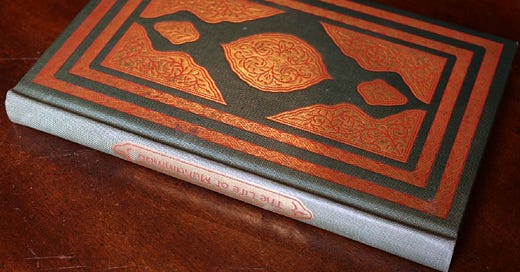The 'Satanic Verses' and the Qur'an's Supreme Test
The Day the 'Evil One' Added to Islam's Holy Book
When challenged about the authenticity of the Qur’an, Muhammad (placing his answer in the mouth of Allah) had an answer ready: And if you are in doubt as to which We have revealed to Our servant, then produce a Sura (chapter) like it, and call on your helper, besides Allah, if you are truthful.” (Qur’an 2:23).
Let’s ignore for a moment how entirely subjective this test is, and focus on the fact that Islamic history relates that this test has, in fact, been met. In fact, Satan himself wrote a ‘sura like it’!
The most reliable biography of Muhammad, Ibn Ishaq's Sira, features an intriguing account made famous by Salman Rushdie's novel The Satanic Verses. This is revealed in a story that has far-reaching ramifications for our understanding of the Qur'an's inspiration.
According to Ibn-Ishaq, Muhammad narrated the following statement as part of the Qur’an 53:19-20: “Have you thought of al-Lat and al-‘Uzza and Manat the third, the other. These are the high-flying cranes; verily their intercession is accepted with approval.”
The names al-Lat, al-'Uzza, and Manat belonged to pre-Islamic goddesses who were highly revered by the inhabitants of Mecca (most of whom were initially hostile to Muhammad's doctrine of just one God). The Meccans were overjoyed by this revelation since it appeared to give their adored deities a place in Islam. Muhammad's supporters, on the other hand, were less enthusiastic. They had given up so much for the sake of monotheism that they couldn't comprehend why it was now being abandoned.
Faced with an uprising, Muhammad had no choice but to retreat. He devised an ingenious solution by stating that the final verse was revealed by Satan and, as a result, should be expunged from the Qur'an (thus the term "Satanic Verses"). So, despite being narrated by Muhammad, these verses does not appear in the modern Qur'an.
These events raise troubling questions for believing Muslims. Including:
Is it possible that Muhammad was willing to compromise his strict monotheism for political gain?
If his followers had not objected, what would have happened to the development of Islam? Would these deities have been formally incorporated into the Muslim religion?
How can we be expected to follow someone who was so readily misled on such a crucial issue?
Above all, this occurrence establishes the existence of a 'Sura like it' that was so convincing that even the prophet himself was hoodwinked.
For and in-depth analysis of the truth-claims of Islam, please see my book ‘Questioning Islam - Tough Questions and Honest Answers About the Muslim Religion’
Kind regards,
Peter
If you have not done so already, please use the button below to subscribe. If you would like to support my work, you have the option to upgrade to a paid subscription at $6 per month.
Please share this message by using the button below:




Peter, your newsletter on "The 'Satanic Verses' and the Qur'an's Supreme Test" is a compelling and bold examination of a critical issue in Islamic history. As a Reformed Christian, I deeply appreciate your commitment to uncovering the truth and engaging with the historical record, like Ibn Ishaq’s Sira, to reveal the challenges surrounding the Qur’an’s authenticity. The incident you describe—where Muhammad initially included verses that seemed to honor pagan deities, only to later attribute them to Satan—raises serious concerns about the reliability of his prophethood. It’s a sobering reminder of the importance of testing all truth claims against the unchanging standard of God’s Word, as we’re called to do in 1 Thessalonians 5:21.
This account strengthens my conviction in the unique inspiration of the Bible, which, through the Holy Spirit’s guidance, has been preserved without such contradictions or retractions. Your questions about Muhammad’s potential compromise and the implications for Islam’s development are vital for anyone seeking truth, and I’m grateful for your courage in addressing them. I’ll definitely be checking out your book, Questioning Islam, to dig deeper into these issues. Thank you for equipping believers to engage thoughtfully and faithfully with these topics!